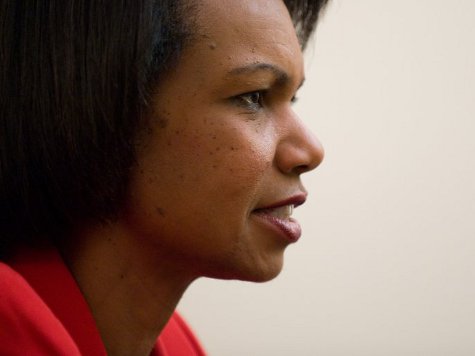I have followed the career of Mitt Romney since 1994. I have read every book about and by him, and I have studied every move he made in the land of my birth. This is why I am convinced Romney will choose Condi Rice for the vice presidency: Massachusetts history, inside baseball, tactics, and temperament.
First, history. In their magnificent book, The Real Romney, authors Michael Kranish and Scott Helman give an account of the Romney selection process for lieutenant governor. Romney’s presumptive choice was going to be Jim Rappaport, a wealthy, connected Republican, whom I interviewed during the 2012 primary.
The Romney people — among them Mike Murphy, his campaign consultant, and Robert White, Romney’s longtime associate from Bain — began “working to avert a Romney-Rappaport ticket of two rich white men,” wrote Kranish and Helman. “After evaluating a list of potential alternatives, including African Americans and women, they settled on Kerry Healey, a bright but little-known figure who had two failed campaigns for state representative behind her and a wealthy husband who could neutralize Rappaport’s self-financed effort.”
There was just one problem: Rappaport. Murphy engineered to keep Rappaport off the ticket, even though he won the nominating convention and had worked with Romney to get him the gubernatorial nomination. This, in turn, led to a primary election with Massachusetts Republicans picking between Kerry Healey, the state GOP’s new chairwoman and Romney’s preferred choice, and Rappaport.
The campaign was contentious: Romney’s people threatened to sue Rappaport for printing up bumper stickers labeled “Romney-Rappaport.” Healey, with much help from Romney, won the primary, only to go on and be defeated by Deval Patrick — a former client of David Axelrod, Obama friend, and the first black governor of Massachusetts by the largest rout in recent history. The GOP lost control of the governorship, something it had held for the previous sixteen years.
The choice of Healey was tactical. At the time, Romney’s popularity among women was low and it was feared that in a contest with a woman candidate, Shannon P. O’Brien, he would lose the female vote. Healey’s position on abortion was pro-choice, as is Condi Rice’s. Then, as now, Ann Romney recommended that he not pick another white male.
Now, the inside baseball. After Bret Stephens of the Wall Street Journal savaged Romney’s would-be choice of Condi Rice, Peggy Noonan, the doyenne of establishment Republicanism, wrote a glowing portrait of her and said that when she suggested Rice’s name at a speaking event, it was met with applause from the audience. Now Robert Costa of National Review says it won’t be Condi, but he is most likely relying on his old colleague (and my friend), Brian J. Bolduc. Bolduc is now a Romney speechwriter who worked with Noonan after his fellowship at the Wall Street Journal. Could it be that Noonan is trying to prepare the ground? Bolduc, of course, would have every incentive to lead Costa, the go-to source for many conservative politicos, astray. Always control the flow of information is the standard rule of dealing with the press on a campaign.
Now, the tactics. It is clear that Rice, despite protestations to the contrary, has political aspirations. She is on the lecture circuit and spoke at my alma mater–Claremont McKenna’s Res Publica Society. This is the same program that brought Secretary of Defense Bob Gates, Secretary of Homeland Security Michael Chertoff, and Mitt Romney. There was a meeting beforehand with top fundraisers at Claremont. Rice has also written two books post-Bush office, but unlike others, notably Rumsfeld and Cheney, the books reveal precious little, indicative that she is not yet finished in the public eye. They discuss her historic life as the child of segregated Birmingham, Alabama. It is historic and it is impressive. It is the real black American experience, not the contrived, composite experience of Barack Obama.
Naming Rice protects Romney from the race question, which will surely be raised because of his Mormonism. It reminds people of his family’s commitment to civil rights (something he has long shared), and it allows him to speak to women. Besides, like with Healey, Romney doesn’t have to worry about being overshadowed by Rice.
It is not surprising in the least that Ann Romney endorsed Mia Love, the black Mormon candidate running for Congress in Utah, in late June. This is the only candidate that Ann Romney has endorsed. Why? It is simply likely that they have race on the mind. In the same way, Ann’s statement about how the vice president is likely to be a woman shows a desire to appeal to female voters. There are no accidents in this campaign, and that trial balloon was certainly something that they had in mind.
Finally, naming Rice also connects Romney to the Bush camp’s finances without drawing attention to the more controversial Bush policies. In so doing, Romney neutralizes the novelty of the first black president by introducing the first African-American woman vice president. If he peels away 10% of the black vote, the election is finished for Obama. He simply won’t be able to compete. Moreover, Rice, who has never married and been a career professional her whole life, can defend Romney among moderates, women, and minorities.
Which brings us to the NAACP speech earlier this week. Romney is known for pandering on the campaign trail. He has pandered to black audiences before; his gaffe of saying “who let the dogs out” among blacks was painful. Why didn’t he do it here? Because he chose Rice. Romney’s statement that blacks would vote for him if they knew what was “in his heart” was the foreshadowing. By picking Rice, the thinking goes, he’ll show what’s in his heart.
**UPDATE: When asked if Bolduc was the source, Costa neither confirmed, nor denied it, noting that he never discussed sources.

COMMENTS
Please let us know if you're having issues with commenting.